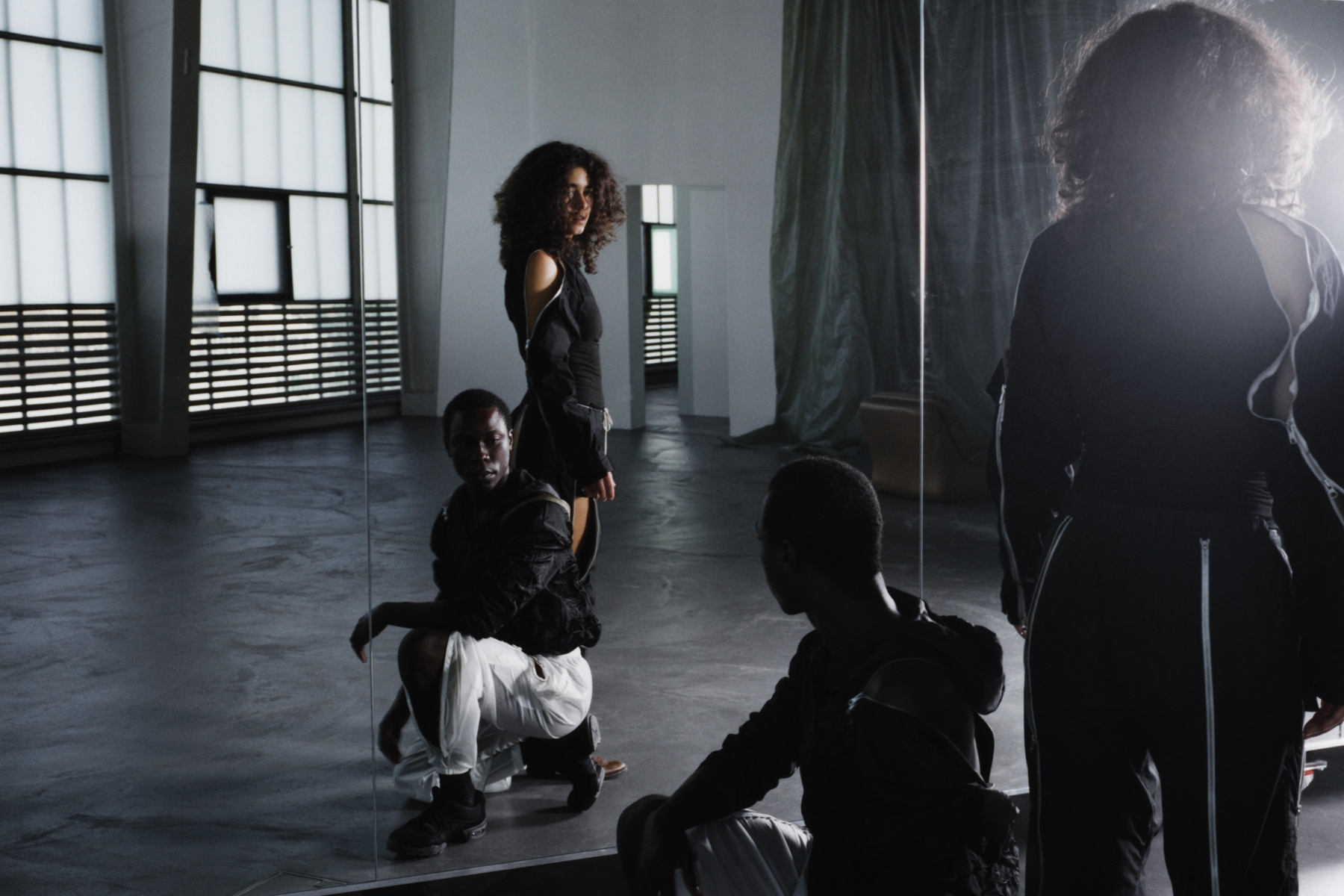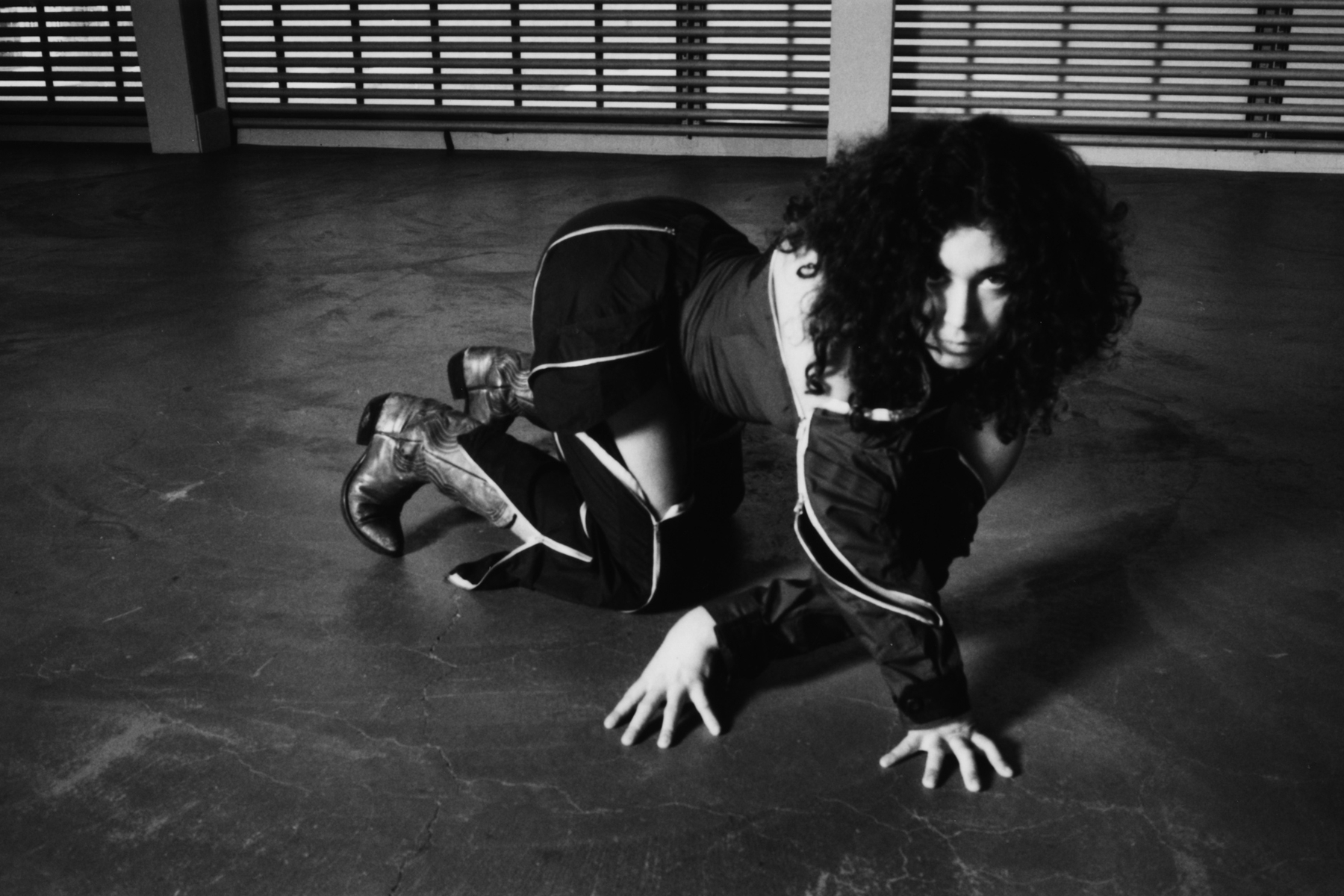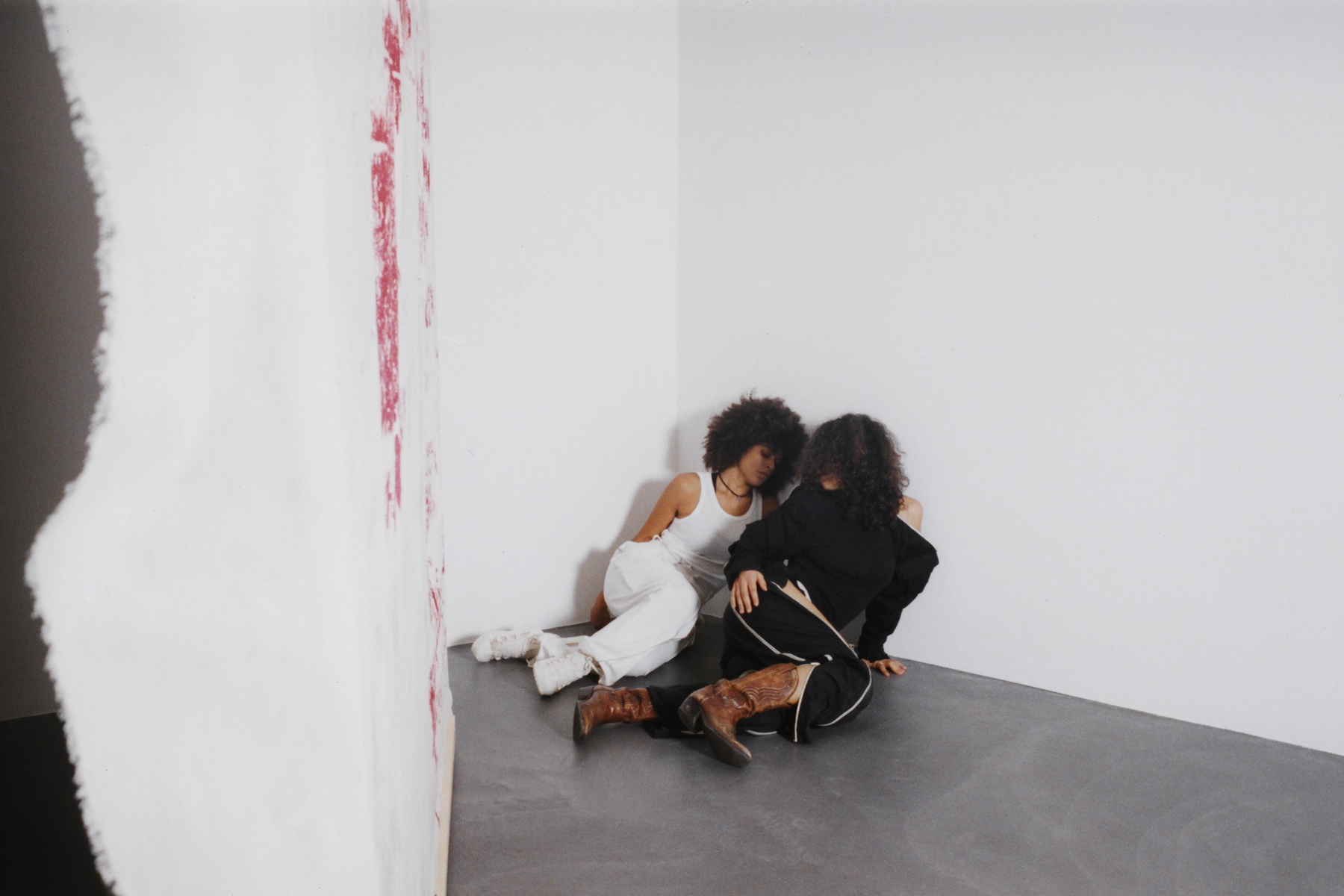Scalable Skeletal Escalator at Kunsthalle Zurich, talking to Isabel Lewis, Yolanda Zobel & Marcelo Alcaide
Artists Isabel Lewis, Marcelo Alcaide and designer Yolanda Zobel on crafting the garments of 'Scalable Skeletal Escalator' at Kunsthalle Zurich, why collaborating is essential, and how doubt and relentlessness are part of life.
PHOTOGRAPHY Mathilde Agius



What does your daily practice look like at the moment?
Isabel Lewis: For the last two months I have been inhabiting the inside of a living exhibition and attending to its needs. This moves me almost hourly between the mundane and the extraordinary. Today I was cleaning surfaces like the large mirror object in the show and wiping down the microphones we use while performing. I was also producing and live processing music, dancing alongside the other performers and interacting with the public in the odd world my collaborators and I have woven together inside the Kunsthalle Zurich and the Löwenbräu building.
Yolanda Zobel: My daily practice consists in working on giving the unknow trust.
Marcelo Alcaide: It’s been a long way this year. From my stay in Sao Paulo during the first part, to my final return home, Berlin, after the last two years in Paris.
Essentially at the moment, rediscovering and building up are my mottos.


Would you say you are an introvert, or the opposite? What is the opposite actually?
Yolanda Zobel: The opposite is necessary to create balance. The ultimate goal.
Marcelo Alcaide: Depending on the occasion.
Definitely more intro these days, and more balanced, if that makes sense.



What role does collaboration play for you?
Isabel Lewis: Collaboration is life. This is what I continue to learn on so many different registers, from my family history to being a dancer, and from things I’ve chosen to study like evolutionary biologist Dr. Lynn Margulis’ writing on cooperative and symbiotic relationships between species as being the driving force of evolution. Being a member of a family that emigrated from the Dominican Republic to the USA in the 80s it was made clear to me that everyone had a role to play in keeping our household running. Working together was a concrete part of our survival. Being a dancer working in the theater as I did for many years is also to participate in culture of collaboration. Multiple people with multiple skill sets work together in the production of a stage work. I continue my work informed by these histories along my interests in learning about flourishing and adaptation from ecology.


Yolanda Zobel: Collaboration reinforces a contact with my feminine side and disrupts all previously relevant ideas. Through the energy released by the exchanges with Isabel Lewis and other longtime collaborators, as Marcelo, I am challenged to question my method and outcome.
I am into collaborating through different forms that are united in their message rather then through their medium.
Marcelo Alcaide: Collaboration is a central element in most of my practices. ‘No man is an island’. Growing up as the middle child, cooperation is also part of everyday life survival.
In this specific case, we are witnessing the result of an evolutionary process within merging two of my longer and stronger collaborative partners, Yolanda and Isabel.


What are the things you’re moving away from right now?
Isabel Lewis: Constant international travel, short-term travel, short-term projects and short-term commitments.
Marcelo Alcaide: Short-commitments and the ordinary. Eating meat and drinking coffee.
Yolanda Zobel: The rational and scientific.



Do you care for stability in your personal life? How does that look/feel like?
Isabel Lewis: I long for stability, I try to care for it in my personal life by attending to my relationships with family, biological and chosen, but precarity feels like it’s always there. This anxiety about precarity and stability might be a habit of the mind. It might be relieved if I could remember that stability is always temporary relative to different time scales.
I know I would certainly like to experience relief from restlessness, and I think that might have to do with cultivating a connection to land and attending to my specific ecological relations.
I don’t yet know what that looks like but I think it begins to making certain kinds of commitments to place.
Marcelo Alcaide: It plays a major role, we all long for it - personally and in work. However I feel again that without any precarity, moments of creation would not exist.
Stability is always temporary, but yet essential to function.
Yolanda Zobel: I do. It feels like an inner guide, home, stillness, selfcare and love.


Is your practice about expressing something? If yes, can you explain, and if not, what would you say it is about?
Isabel Lewis: Yes, I think my practice is about expressing a doubt in Western modernist habits of being and doing. I try to go further than only critique these modes and try to model alternative ways of being and working together.
Marcelo Alcaide: I try to focus my different practices on finding new forms of language and responsiveness to the current status quo, not only applying a form of criticism.
A lot of it is about bridging worlds, too.
Yolanda Zobel: I like the feeling of “an annihilation of borders without chaos. “ written by Dino Bonacic about my work.



How do you think of the fact that people consume your work? Do you picture what’s in their head/body when they do?
Isabel Lewis: I see my work as a conversation with the public under particular conditions and within specific contexts.
I do feel I provide some kind of strange service that has to do with offering a space for a recalibration of our specifically human capacities and maybe the heightening of the senses in order be awake to our participation in world-making.
Gathering than picturing the public I try to attend to and leave space for multiple perspectives in my work while acknowledging and laying bare the limitations of my own point of view.
Marcelo Alcaide: I hope that who consumes my work can process my reflections and question themselves about their own position. Somehow disruptive but ever constructive.
Yolanda Zobel: Group power. Genders, generations and sexualities colliding in harmony…

Do you write, do you read - what is your relationship to words? And in which language(s)?
Isabel Lewis: Yes, I write and read. I do a lot of reading and mostly email writing but also sometimes essay and songwriting. Reading almost any kind of text (except the daily news) has a kind of meditative effect on me. Words are scary and powerful with their magical potential to both create and destroy. Currently I read theoretical texts and novels in English, I read poetry and speak to my family Spanish and English, and I read bureaucratic texts in German.
I also pay particular attention to nonverbal languages of the body and especially social dances.
Marcelo Alcaide: I do read a lot online, work and non related, but more and more dedicating time to not only. I have been also writing often this year, after an absence, period with the need of expressing more towards words again. Words are power. I read in Portuguese and English mostly.
Yolanda Zobel: I read news in different languages.


What is on your bedside right now?
Isabel Lewis: 'Love Or Greatness: Max Weber and Masculine Thinking - a Feminist Inquiry' by Roslyn Bologh, a notebook, a laptop.
Marcelo Alcaide: 'The faggots and their friends between revolutions' by Larry Mitchell, 'Notes on Nationalism' by George Orwell, 'Fame' by Andy Warhol, myrrhe, bedtime gadgets and my laptop.
Yolanda Zobel: Creams, toys, earplugs, notebook.


